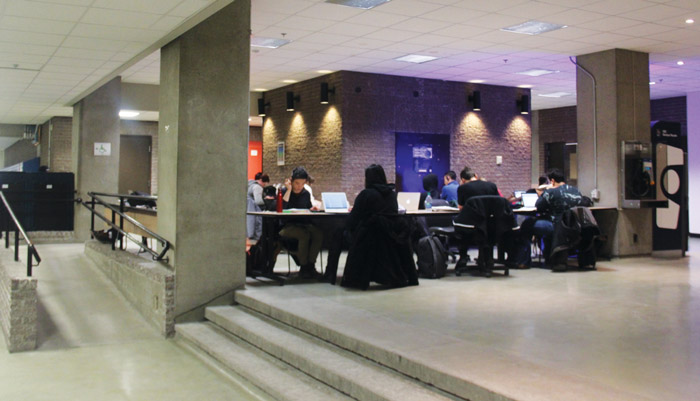Students from the Faculties of Science and Arts & Science have launched a crowdfunding campaign to renovate the Burnside Basement. The initiative is hosted on McGill’s Seeds of Change fundraising platform, which was launched in May 2014.
“[The project aims to] help a group of entrepreneurial students […] transform their dark and dreary Burnside Basement into a welcoming all-access space for students to study, relax, exchange ideas, and obtain essential resources,” the project website reads.
The renovations, which are slated to primarily occur during the summer months, do not have a fixed timeline for completion. According to Jeremy Goh, U2 Science and a member of the project team, both short-term and long-term changes are planned for the space [and] aim to improve student usability and sustainability of the building.
“Ideally, we’d like to replace the furniture, create a group study area with surfaces for collaborating, and improve the lighting of the space,” Goh said. “For later phases, we want to explore how feasible it would be to section off the space to reduce noise pollution.”
Eric Mitchell, U2 Science and Vice-President External of the Neuroscience Undergraduates of McGill (NUM), a group that has an office in the Burnside basement, said that the project is a positive step towards improving the space, which is currently the primary student space for students in the Faculties of Science and Arts & Science.
“I don’t think the basement adequately meets the needs of science students currently,” Mitchell said. “In its role as a main hub for us, it needs to be improved. Currently the space lacks proper studying infrastructure–desks, chairs, and couches are either in poor condition or insufficient in quantity.”
This is not the only student-initiated effort to improve spaces primarily used by students. Earlier this year, the Management Undergraduate Society (MUS) passed a referendum question that instituted a $40 per semester per student non-opt-outable space improvement fee for the Bronfman Building. The Science Undergraduate Society (SUS) also introduced the Student Space Improvement Fee (SCSS) earlier this year following a referendum. Funds from the SCSS fee will also help with renovations of Burnside Hall.
According to Goh, funding the renovations through Seeds of Change was suggested by the Faculty of Science administration as a way to draw alumni support for renovations.
“The crowdfunding project allows the funds to be raised to be used almost immediately after the campaign ends, [letting] us start the renovations during the summer,” Goh explained. “Additionally, only a portion of the [SCSS] fee is eligible to go towards initiatives like [the] Burnside basement and the budget must be passed through [the SUS] General Council. This means that the funds from the [SCSS] fee would not be put towards Burnside until October of Fall 2015.”
Goh also expressed that the $6,000 target for the project was set based on previous campaigns and strategies, and that a budget for the predicted renovations is yet to be determined.
“The budget for the renovations will happen once we receive quotes from McGill Facilities and the designer,” Goh said. “Since the project must be completed through […] McGill, prices are higher than hiring an [external] contractor. Everything we want to do in terms of construction has to go through McGill, but purchases for furniture can be through external sources. However, if we get a whiteboard, for example, it will need to be installed by a union worker from McGill, for which we will be charged.”
Rafael Páez Estrada, a recent graduate from the Faculty of Science from the class of 2014, sees the renovations as necessary to help current students create a better sense of identity.
“I think that the initiative is extremely important from a practical point of view, but also from an identity point of view,” he said. “It’s important to have our space be something we are proud of, and a place where we can feel comfortable.”
Páez Estrada also underscored the importance of parental and alumni support.
“Donating and encouraging parents to do so is crucial because it will also add a sense of belonging to the place,” Estrada said. “I intend to donate as soon as the summer starts and I start working and making money.”
Mitchell stated that he was appreciative of students’ efforts given the lack of tangible support from the administration to improve existing infrastructure.
“In an ideal world, this project wouldn’t have to happen,” Mitchell said. “I know that SUS has taken part in negotiations with McGill [in the past] and there hasn’t been much progress with regards to the university’s support for science student spaces.”









